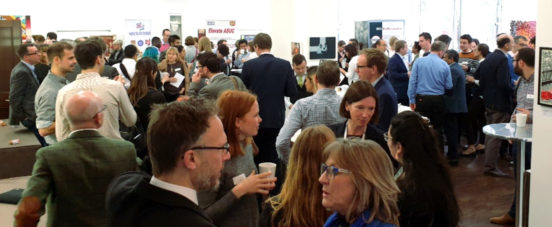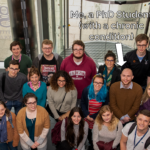Alternatively titled: Why I was insane enough to travel from Edinburgh to London and back in one day.
I know in my last blog post I said I would be talking about previous attempts to predict IBD flares in published research but plans change! On the 11th November, I attended the British Society of Gastroenterology‘s IBD principal investigators meeting in London where the leads on some of the most exciting IBD studies in the UK spoke about their research (or prospective research). It was truly brilliant to meet so many people enthusiastic about research in IBD. There were talks and posters on IBD studies in addition to plenty of opportunities to have discussions. For this blog post, I am going to talk about some of the studies discussed at the meeting. In the interest of word count and due to the nature of some studies, I’ve not been able to talk about every project discussed at the meeting but here are some of them!
IBD BioResource
The IBD BioResource is less of a study and more of a, well… resource. Having recruited over 25,000 IBD patients, the BioResource banks patient data on disease extent, prescription response and current medication. Genetic samples are also collected for sequencing which should allow genetic markers of disease, risk severity, and drug response to be found. If consent is given, the BioResource can also be used to recruit participants to studies by genotype and/or phenotype which is a brilliant utility for researchers. Our study, PREdiCCt has a close relationship with the IBD BioResource and all of our participants have the option of also joining the BioResource when they join us.
Wellcome Sanger Institute
Carl Anderson, of the Wellcome Sanger Institute, spoke briefly on some of the work his team is using the BioResource for. Carl spoke of using genetics to predict disease course: questioning if the polygenicity of IBD explains the variation in disease outcomes. Using gene expression to find new potential drug targets was also an interesting topic of discussion.
CD-TREAT
Vaios Solos, from the University of Glasgow, detailed CD-TREAT. Exclusive enteral nutrition (EEN), a liquid diet, is the only established dietary treatment for Crohn’s disease, but patients often struggle to follow such a diet. Once EEN is ceased, symptoms typically return. Vaios and his collaborators have created the CD-TREAT diet which attempts to mimic the effect EEN has on the gut microbiome whilst being far more tolerable for patients by consisting of ordinary food. CD-TREAT is currently aiming to recruit 60 patients who will follow the diet for 8 weeks: unless symptoms worsen during the study. Research from CD-TREAT is already publicly available.
IBD-BOOST
Finally, IBD-BOOST is a UK-wide study investigating the relationship between fatigue, pain and urgency in IBD using multiple regression. This study brings together IBD symptoms and its effect on quality of life. Some participants are then recruited to IBD-BOOST OPTIMISE which is an interventional trial in which fatigue, pain and urgency attempt to be managed via a nurse-led algorithm.
And that is the end of my, admittedly very short, summaries of some of the most interesting IBD research taking place in the UK. Unfortunately, my time is quite limited at present, worsened significantly by poor health. Maybe at some point I will discuss being a PhD student with a chronic condition. I should probably use my next blog post to finally talk about research which has undertaken with the aim of predicting IBD flares first, but we’ll see how that works out! Regardless of what I talk about next, follow me on Twitter to find out what and when I next post!






